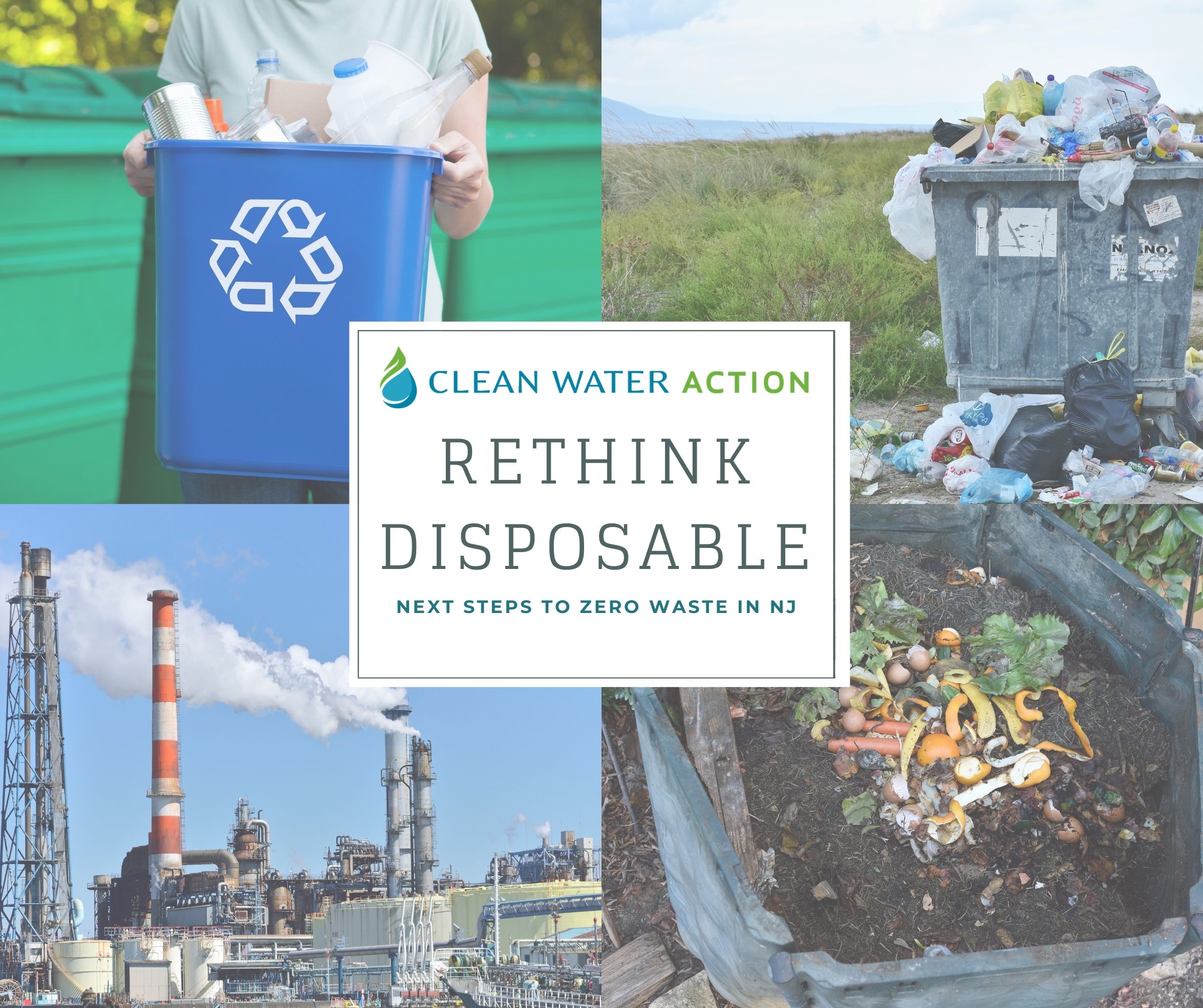
New Jersey’s ban on single-use carryout bags and polystyrene foam containers will go into effect one year from now, or May 2022! This victory was the result of the groundswell of concern over the damage being caused to our environment by waste and single-use plastics. This is only the beginning of the paradigm shift toward zero waste happening in New Jersey, across the U.S., and around the world. In the next part of our ReThink Disposable Blog Series, we will take a look at state policies in the works that will move us ever closer toward a zero waste future. (You can read Part 1 of the series here and Part II here.
Part III: Next Steps for Statewide Zero Waste Policies
Right on the heels of New Jersey’s bag ban is a new bill (S2515) that would require manufacturers of rigid plastic containers, beverage containers, glass, and paper products to increase the percentage of post-consumer recycled content in their products. Post-consumer recycled content bills, like the one in NJ, are popping up across the country, along with bottle deposit bills, Right to Repair bills, bans and fees on plastics that are difficult to recycle, state procurement policies that prioritize recycled and reused products, and pay-as-you-throw programs.
While we cannot recycle our way out of the global plastic pollution crisis, these bills aim to improve recycling markets by creating a demand for and cleaner supply of recyclable materials than what recyclers and manufacturers currently have to work with - a contaminated mixture of all sorts of plastics and garbage that is really difficult to recycle into new products. These bills are an important step in stopping the production of virgin single-use plastics and keeping plastics out of polluting incinerators and landfills and the environment.
Clean Water Action is working with the New Jersey bill's sponsor, State Senator Bob Smith, and NJ Department of Environmental Protection (NJDEP) to make sure it establishes the fastest possible timeline for reaching its goals. The NJDEP has requested an extended timeline to develop sufficient infrastructure and cleaner supply of recyclable materials for recyclers and manufacturers. However, with the possible exception of California, recycling markets are not confined within state lines. They tend to be more regional. With the continued regional, national, and global momentum toward zero waste, infrastructure and supply are already on their way to fixing themselves with new innovations and policies. NJ and other states need to write these laws with the actions of the entire region in mind and be aspirational with our timelines.
About a dozen states are considering extended producer responsibility (EPR) bills, another type of zero waste policy that often includes post-consumer recycled content standards. EPR policies come in many forms but generally aim to hold the producers of plastic and paper packaging responsible for the costs associated with managing waste so that these costs are not placed on municipalities and taxpayers. EPR bills often require producers to develop plans to finance local recycling programs and infrastructure, as well as incentivize redesign of packaging to be more readily recyclable, or better yet, avoided or reusable.
Successful versions of EPR policies already exist in the form of producer take-back for products like batteries and paint. However, unintended problems happen when private industry (even when acting through non-profit “producer responsibility organizations”) has control over what product stewardship plans look like and how funding is spent. For example, some industry-controlled EPR programs have opened up opportunities for incineration and chemical recycling, dangerous false solutions promoted by the chemical industry and big waste management corporations.
Alternative versions of EPR for packaging materials promote more democratic control by state and local governments over how much funds are needed and where they should be spent. The problem is that with about a dozen EPR bills in the works all over the country, the chemical industry and manufacturers are starting to realize EPR might happen whether they like it or not. Lobbyists from the American Chemistry Council and packaging industry are shifting toward supporting these corporate-controlled versions of EPR. With the support from these powerful groups or neutralized lack of opposition, these corporate versions of the bill are more likely to pass, giving control over the recycling industry to polluters.
While post-consumer recycled content and EPR are gaining momentum, there are many other statewide policies that can influence regional and national movement toward zero waste. States and local organizers should consider the following zero waste options:
- Eliminate incineration and chemical recycling from any tax credits or subsidies relating to renewable energy or recycling.
- Ban compostable organics from landfill or incineration.
- Fund local zero waste systems that focus on reuse.
- Turn off the plastic pollution tap by rejecting fossil fuel infrastructure projects that support the industry at the root of the problem.
Many of these ideas are already in the works in New Jersey and other states. Because solid waste tends to be regionally managed and has regional impacts, we are going to need coordinated efforts between states and regions in addition to local community-based solutions to get these over the finish line and to get out ahead of the chemical industry and other plastic polluters.
Check out what other Clean Water Action states are doing on the zero waste front:


